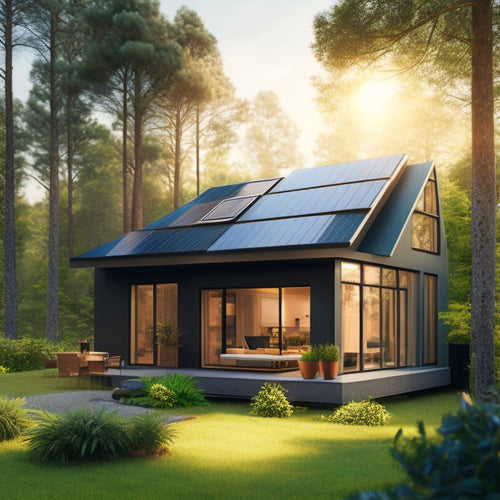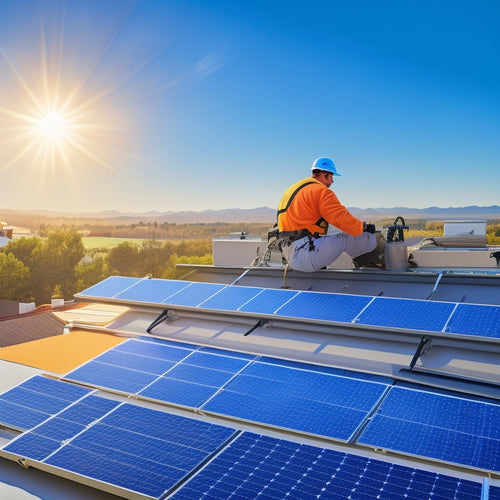
Solar Panel Systems for Houses - Prices and Features
Share
When considering a solar panel system for your house, expect upfront costs ranging from $15,000 to $30,000, influenced by system size and quality. Financing options like solar leasing, loans, and power purchase agreements can help spread the cost over time. You'll need to assess your energy needs and budget to determine the right system for you. There are various types of systems, including grid-tied, off-grid, and hybrid, each with its own benefits. Monocrystalline and polycrystalline panels offer different efficiency and cost trade-offs. As you investigate your options, you'll find that understanding the details will be key to making an informed decision that's right for you and your home.
Key Takeaways
- Residential solar panel costs range from $15,000 to $30,000, influenced by system size and quality.
- Financing options include solar leasing, loans, and power purchase agreements, enabling cost spreading over time.
- System size, efficiency, and power requirements are crucial, with typical systems consisting of 15 to 30 photovoltaic panels.
- Monocrystalline and polycrystalline panels differ in efficiency (20%+ vs. 15-17%) and cost, with a lifespan of approximately 25-30 years.
- Federal and state incentives, such as tax credits and rebates, can help offset solar panel installation costs, reducing expenses.
Residential Solar Panel Costs
As you contemplate utilizing the power of solar energy for your home, a crucial factor to weigh is the cost of residential solar panel systems. The upfront cost of purchasing a system can be substantial, ranging from $15,000 to $30,000 or more, depending on the size and quality of the system.
However, there are financing options available to make solar energy more accessible. You can investigate solar leasing, which allows you to rent a system for a fixed monthly fee, often with little to no upfront cost. This option can provide immediate savings on your electricity bill.
Alternatively, you can consider financing options like loans or power purchase agreements, which can help spread the cost of the system over time.
It's vital to assess your budget and energy needs to determine the best approach for your situation. By understanding the costs and financing options, you can make an informed decision about investing in a residential solar panel system for your home.
System Size and Efficiency Matters
Most residential solar panel systems comprise between 15 and 30 photovoltaic (PV) panels, with each panel typically measuring around 39 inches by 65 inches.
You'll want to take into account the system size and efficiency when selecting a solar panel system for your house, as these factors directly impact system performance and energy output.
Key considerations for system size and efficiency include:
-
System wattage: A higher wattage system will produce more energy, but it also increases the upfront cost. You'll need to balance your energy needs with your budget.
-
Panel efficiency: More efficient panels produce more energy per hour of sunlight, but they're also more expensive. Look for panels with high efficiency ratings (e.g., 20% or higher) for maximum performance.
-
Inverter type: The inverter converts DC power from the panels to AC power for your home. String inverters are common, but microinverters and power optimizers can offer better performance and monitoring capabilities.
- System configuration: The way panels are configured on your roof affects energy output. A well-designed system with minimal shading and ideal orientation will maximize energy production.
Types of Solar Panel Systems
When selecting a solar panel system for your house, you'll encounter different types that cater to various needs and budgets. These systems vary with respect to design, functionality, and installation techniques. You can choose from grid-tied, off-grid, and hybrid systems, each with its unique advantages and disadvantages.
Grid-tied systems are the most common, connecting your house to the grid and allowing you to sell excess energy back to the utility company. Off-grid systems, on the other hand, are ideal for remote areas with no access to the grid. Hybrid systems combine the benefits of both, providing a backup power source during outages.
Recent solar technology advancements have led to the development of more efficient and cost-effective systems. For instance, building-integrated photovoltaics (BIPV) integrate solar panels into your roof, providing both energy generation and building envelope functionality.
Other options include solar shingles, solar tiles, and solar-powered water pumps. When choosing a system, consider factors like your energy needs, budget, and local building codes.
Monocrystalline Vs Polycrystalline Panels
Compare the efficiency and cost-effectiveness of two popular solar panel materials: monocrystalline and polycrystalline silicon. When choosing a solar panel system for your house, you need to evaluate the type of panel that suits your energy needs and budget.
Monocrystalline silicon panels are made from a single crystal structure, making them more efficient than polycrystalline panels. They've a higher power output per hour of sunlight and are more expensive.
On the other hand, polycrystalline silicon panels are made from multiple crystal structures, making them less efficient but more affordable.
Here are some key differences to evaluate:
-
Efficiency comparison: Monocrystalline panels have an average efficiency rate of 20%, while polycrystalline panels have an average efficiency rate of 15-17%.
-
Panel lifespan: Both types of panels have a similar lifespan of 25-30 years.
-
Cost: Monocrystalline panels are generally more expensive than polycrystalline panels.
- Space efficiency: Monocrystalline panels require less space to generate the same amount of power as polycrystalline panels.
Inverter and Mounting Options
You've selected your solar panel type, now it's time to reflect on the inverter and mounting options that will bring your system to life.
The inverter technology you choose plays an essential role in converting DC power from your solar panels into AC power for your home. String inverters, microinverters, and power optimizers are popular options, each with their own advantages.
String inverters are cost-effective, but may not perform well with partial shading. Microinverters, on the other hand, provide maximum flexibility and monitoring capabilities. Power optimizers offer a compromise between the two.
When it comes to mounting solutions, you'll need to determine between roof-mounted and ground-mounted systems. Roof-mounted systems are more common, but may require additional structural support.
Ground-mounted systems offer more flexibility regarding panel angle and orientation, but require more land and may be more expensive. You'll also need to take into account tracking systems, which allow your panels to follow the sun's movement for maximum energy output.
Battery Backup and Storage
As you contemplate integrating a solar panel system into your home, incorporating a battery backup and storage solution can greatly enhance its overall performance and reliability.
This feature allows you to store excess energy generated by your solar panels during the day for use during nighttime or power outages.
When selecting a battery backup and storage solution, you'll need to evaluate the type of battery and its storage capacity.
Some common battery types include lead-acid, lithium-ion, and saltwater batteries, each with its own advantages and disadvantages.
Here are some key factors to weigh:
-
Battery types: Lead-acid batteries are cost-effective but heavy, while lithium-ion batteries are more efficient but expensive.
-
Storage capacity: The amount of energy your battery can store will impact how long you can power your home during an outage.
-
Depth of discharge: This measures how much of the battery's capacity can be safely used without damaging it.
- Round-trip efficiency: This indicates how much energy is lost when charging and discharging the battery.
Installation and Maintenance Needs
When you're planning to install solar panels on your house, you'll need to guarantee your system meets specific requirements, including roof size and structural integrity.
You'll also want to conduct energy efficiency checks to identify areas where energy is being wasted, allowing you to optimize your system's performance.
System Requirements
Installing a solar panel system on your house requires careful consideration of several key factors to guarantee peak performance and longevity.
You need to ascertain your system is compatible with your existing electrical infrastructure and meets your power requirements.
To achieve this, consider the following:
-
System compatibility: Verify the solar panel system is compatible with your house's electrical system, including the type and capacity of your electrical panel and the availability of space for the system's components.
-
Power requirements: Determine your power requirements based on your energy usage patterns and the size of your solar panel system.
-
Roof size and condition: Assess the size and condition of your roof to ascertain it can support the weight of the solar panels and is free from obstructions.
- Local building codes and regulations: Verify that your solar panel system complies with local building codes and regulations, including obtaining necessary permits and approvals.
Energy Efficiency Checks
You've guaranteed your solar panel system meets the necessary requirements, now it's time to focus on energy efficiency checks. This vital step confirms your solar panel system operates at its best level, maximizing energy production and reducing your reliance on the grid.
Conducting energy audits helps identify areas of inefficiency in your home, allowing you to prioritize efficiency upgrades. These upgrades may include sealing air leaks, adding insulation, or upgrading to energy-efficient appliances.
During the installation process, your solar panel system will be connected to a monitoring system, enabling you to track its performance in real-time. This monitoring system will alert you to any potential issues, confirming prompt maintenance and minimizing downtime.
Regular maintenance checks will also be necessary to guarantee your system operates at peak performance. By prioritizing energy efficiency checks, you'll be able to maximize your energy savings and reduce your carbon footprint.
Federal and State Incentives
You're likely wondering how to offset the upfront costs of installing a solar panel system on your house.
Fortunately, you can take advantage of federal and state incentives that can help reduce your expenses.
Specifically, you may be eligible for tax credits and rebate programs that can provide significant savings.
Tax Credits Available
What drives the cost-effectiveness of solar panel systems for houses, aside from their obvious environmental benefits? The answer lies in the tax credits available to homeowners like you. As a homeowner, you can markedly reduce your upfront costs by taking advantage of federal and state incentives.
-
The federal government offers a 26% tax credit on the total cost of your solar panel system, with no upper limit. This means that if your system costs $15,000, you can claim a $3,900 credit on your taxes.
-
Many states also offer additional tax credits or rebates, which can further reduce your costs. For example, California offers a state tax credit of 10% of the total system cost.
-
Some states, like New York, exempt a portion of your solar panel system's value from your property taxes, reducing your annual tax bill.
- Additionally, the federal government allows you to depreciate your solar panel system over five years, which can provide further tax benefits for business owners or those with taxable income.
Rebate Programs Offered
While tax credits provide a considerable incentive, rebate programs offered by federal and state governments can further reduce the upfront cost of solar panel systems for houses.
You can benefit from these programs, which often have varying rebate eligibility criteria and application processes. For instance, the Federal Solar Investment Tax Credit (ITC) allows you to claim a rebate of up to 26% of the total solar panel system cost.
Additionally, state governments offer rebates, such as California's California Solar Initiative (CSI) Thermal Program, which provides rebates for solar water heating systems.
To take advantage of these rebates, you'll need to meet the rebate eligibility criteria, which typically includes installing a solar panel system that meets specific efficiency and safety standards.
The application process usually involves submitting an online application, providing documentation, such as installation certificates and invoices, and waiting for approval.
Energy Efficiency and Savings
Installing solar panel systems on your house can greatly reduce your energy consumption from the grid, leading to substantial savings on your utility bills.
By utilizing the power of the sun, you can greatly decrease your reliance on traditional energy sources. This shift towards sustainable living not only benefits the environment but also your wallet.
Some key benefits of solar panel systems include:
- Reduced energy consumption from the grid, leading to lower utility bills
- Increased energy independence, allowing you to generate your own power
- A potential increase in your property value due to the installation of a solar panel system
- A considerable reduction in your carbon footprint, contributing to a cleaner environment
Top Brands and Manufacturers
Several prominent brands and manufacturers have established themselves as leaders in the solar panel industry, offering high-quality products and innovative solutions for homeowners. You'll find that top brands like Tesla, Panasonic, and SunPower offer premium solar panels with high-efficiency ratings and durable designs.
When comparing brands, consider factors like efficiency, durability, and warranty terms. Manufacturer warranties typically range from 25 to 30 years, covering defects and performance guarantees.
You should also research each brand's installation network and customer support. Some manufacturers, like LG and Trina, provide extensive installation services and dedicated customer support teams. Others, like Hanwha Q CELLS, focus on providing high-quality products with competitive pricing.
Frequently Asked Questions
Can I Install Solar Panels on a Rented Property?
You're likely aware that 70% of Americans rent their homes; now, you're wondering if you can install solar panels on your rented property. Check your rental agreements, as tenant rights may vary, but you'll likely need your landlord's permission before installing solar panels.
Do Solar Panels Work During a Power Outage?
During a power outage, you won't get power from your solar panels unless you have a battery backup system, which provides emergency power. Otherwise, your solar panel efficiency is wasted, as the grid-tied system shuts down for safety reasons.
Can Solar Panels Be Used for Heating Water?
You can utilize solar energy to heat water, enhancing your heating efficiency, with solar water heaters that convert sunlight into thermal energy, providing a reliable and eco-friendly solution for your hot water needs.
Are Solar Panels Compatible With All Roof Types?
You'll find that solar panels are compatible with most roof types, but it depends on the roof materials and installation angles; for instance, panels work well on asphalt shingles, metal, and clay tiles, but may require adjustments for slanted or curved roofs.
Will Solar Panels Increase My Property Value?
You're wondering if solar panels will enhance your property value. Here's the answer: yes, they will! In fact, you can expect a significant return on investment, thanks to the allure of energy independence, making your home a hot commodity on the market.
Related Posts
-

Top Online Stores for Solar Car Accessories
When searching online for solar car accessories, you'll find top retailers like Amazon, REI Co-op, and Best Buy offer...
-

Reduce Solar Panel Cost for Your Small Home
By evaluating your energy needs, choosing the right installer, and selecting cost-effective solar panel options, you ...
-

3 Essential Steps for Solar Electricity Installation
To guarantee a successful solar electricity installation, you'll need to follow three essential steps. First, assess ...


